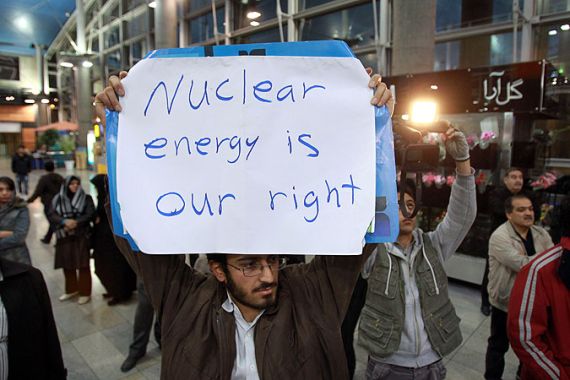Iran ‘doubled capacity’ at nuclear facility
International Atomic Energy Agency report says Iran has doubled uranium-enrichment centrifuges to 2,000 since May.

Iran has doubled the capacity of its Fordo nuclear facility in defiance of UN Security Council resolutions and sanctions, a UN atomic agency report has showed.
The report, circulated to the International Atomic Energy Agency (IAEA) member states on Thursday, but not published, showed that Iran now has around 2,000 uranium-enrichment centrifuges installed compared with around the 1,000 it had in May, at Fordo.
The IAEA also said that its ability to inspect the Parchin military base where it suspects nuclear weapons research has taken place had been “significantly hampered” by a suspected clean-up.
The UN agency said it was still “unable to provide credible assurance about the absence of undeclared nuclear material and activities in Iran, and therefore to conclude that all nuclear material in Iran is in peaceful activities”.
Enriched uranium can be used for peaceful purposes but also, at highly concentrated purities, for nuclear weapons, and multiple UN Security Council resolutions have called on Iran to suspend enrichment.
Iran has maintained that its nuclear programme was civilian and has denied it was trying to make a nuclear bomb.
‘Not seeking nuclear weapons’
Iran’s supreme leader Ayatollah Ali Khamenei told a summit of the Non-Aligned Movement in Tehran on Thursday that his country “is never seeking nuclear weapons” and would “never give up the right to peaceful nuclear energy”.
Fordo is dug into a mountain near the holy city of Qom and mostly enriches to 20 per cent purities, technically speaking a short hop from the 90-per cent needed in a nuclear weapon.
Only around 700 centrifuges are operating at Fordo, however, and monthly production is unchanged at around 15 kg of 20-per cent uranium per month. It is also unclear whether the newly installed machines will also enrich to 20 per cent.
Iran’s stated reason for enriching to 20 per cent is for fuel for a medical research reactor in Tehran, but an official familiar with IAEA investigation said that it “now has enough fuel for more than 10 years”.
The IAEA also wants Iran to address what it believes is evidence that until 2003, and possibly since, Tehran had a structured programme of research into nuclear weapons.
Iran has flatly rejected these claims, set out in a major IAEA report last November, and said it will only give the agency the desired access as part of a broader agreement governing its future relations with the watchdog.
In particular the IAEA wants to be able to visit the Parchin military base near Tehran where it believes Iran conducted explosives tests for nuclear warhead designs.
‘Sanitising nuclear site’
Western nations accuse Tehran of “sanitising” the site to remove evidence and in the new report the IAEA said that Iran “has been conducting activities at that location that will significantly hamper the Agency’s ability to conduct effective verification”.
Citing satellite images, these activities included the demolition of certain buildings, “significant ground scraping and landscaping” over an extensive area and the “shrouding” of buildings, the IAEA said.
Israel has been vocal against Islamic republic’s nuclear programme, accusing it of making nuclear bomb.
The latest in a series of meetings aimed at persuading Iran to give the IAEA access to documents, scientists and sites involved in this alleged drive to get the bomb failed last Friday.
A separate, higher-level renewed diplomatic push in talks between Iran and the “P5+1” five permanent members of the UN Security Council – the US, China, Russia, France and Britain – plus Germany appears stalled, meanwhile.
After their first meeting in 14 months in Istanbul in April, further talks were held in Baghdad in May and then in Moscow in June, where they were however downgraded to lower-level discussions.
Fresh talks between the P5+1 chief negotiator, EU foreign policy chief Catherine Ashton, and Iranian counterpart Saeed Jalili would happen “in the coming days,” Ashton’s spokesman said in Brussels on Thursday.